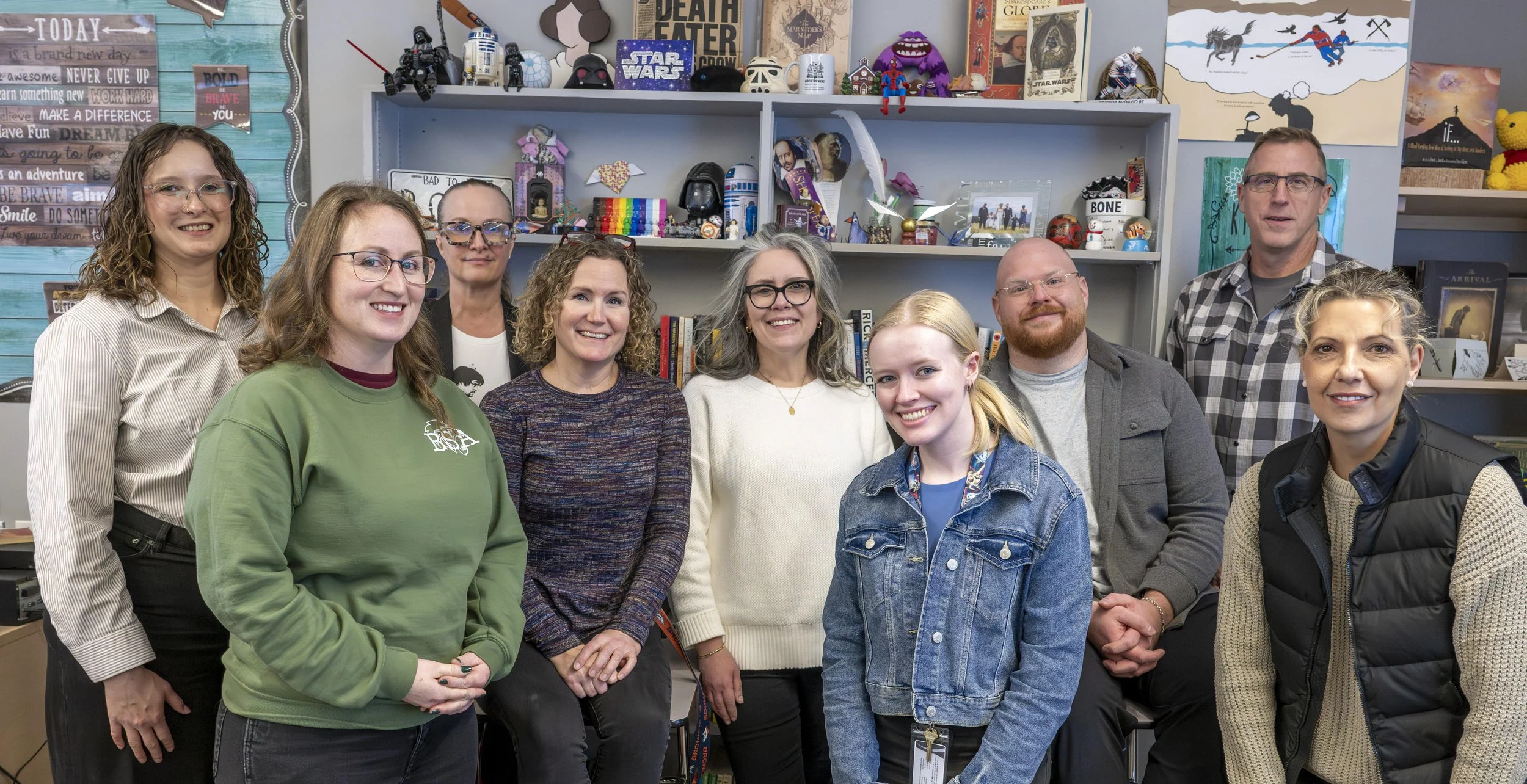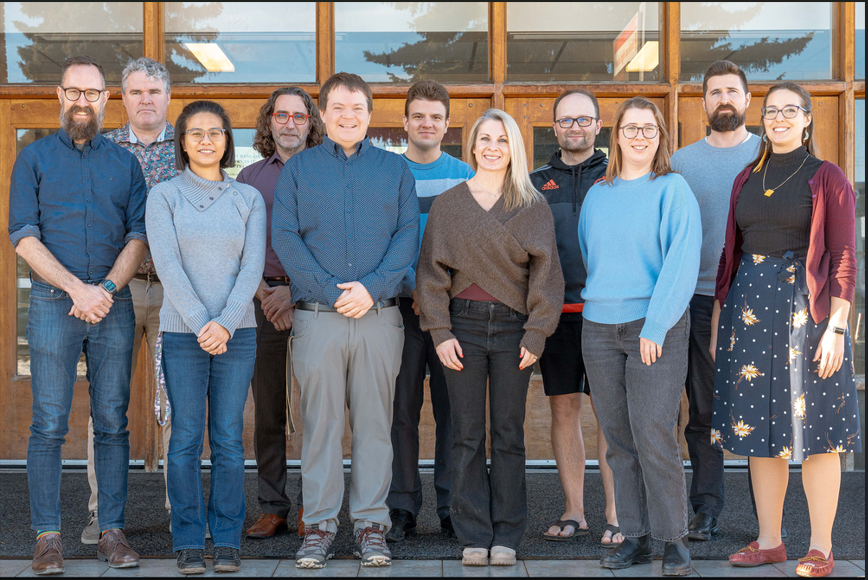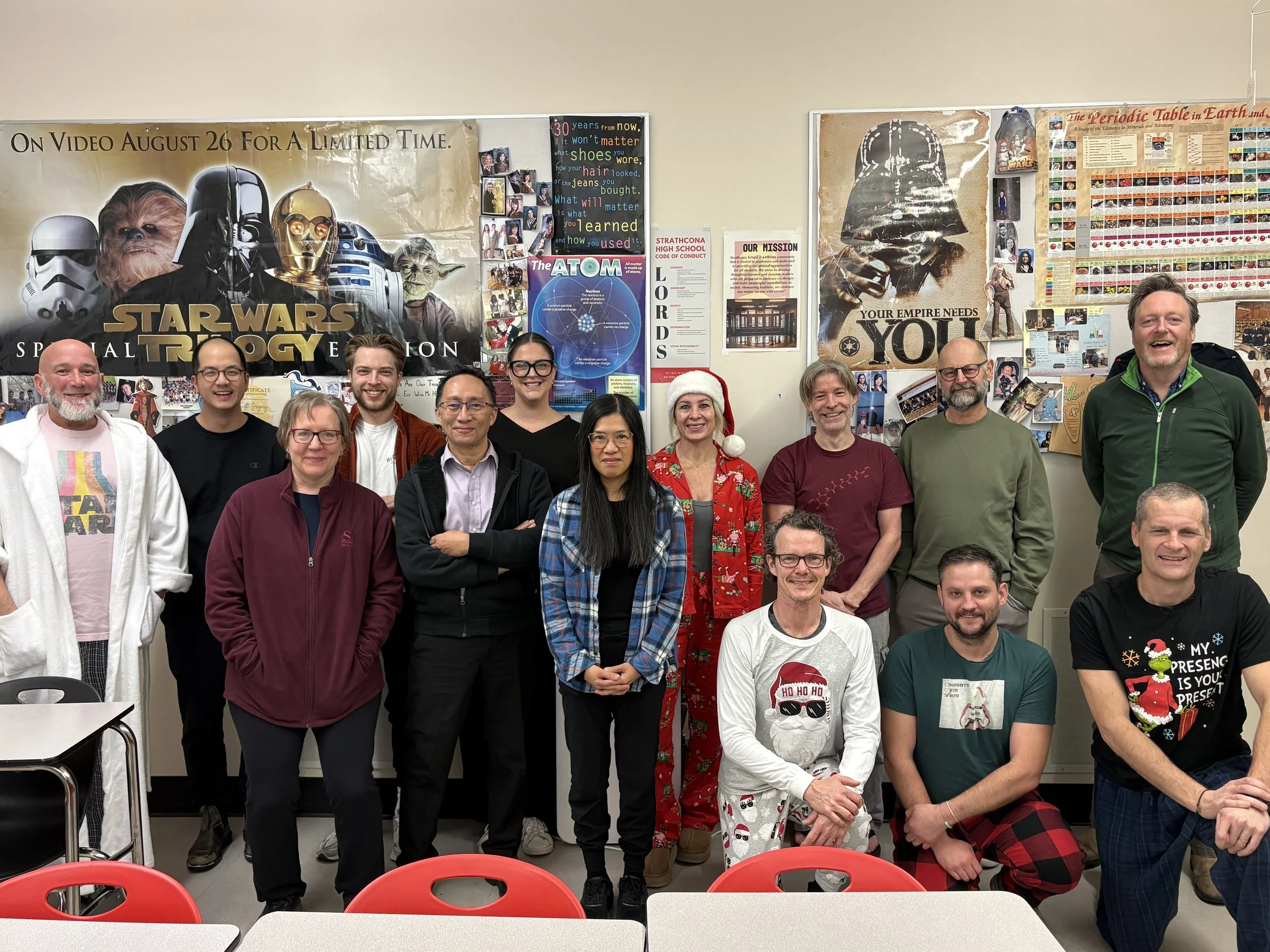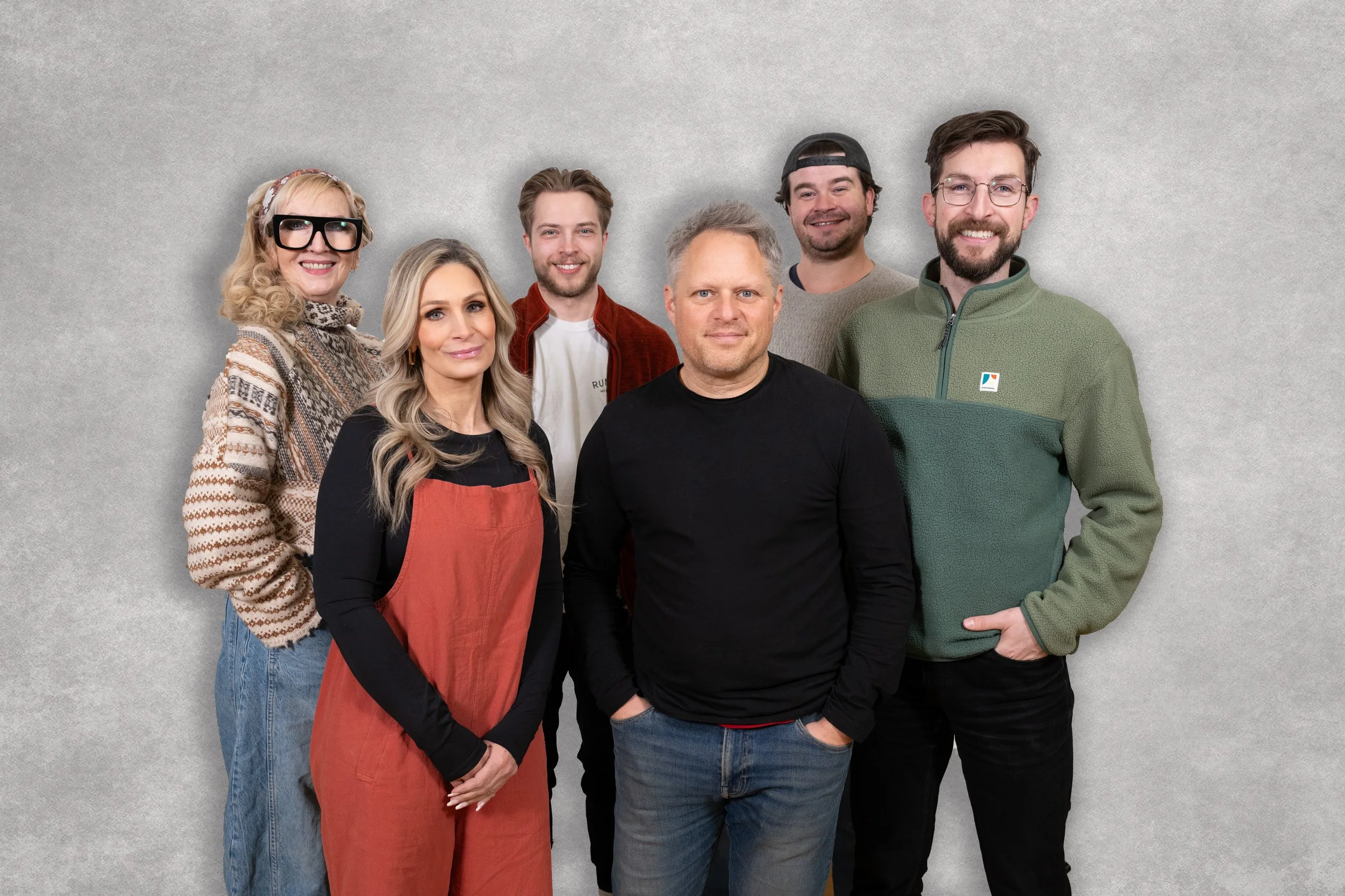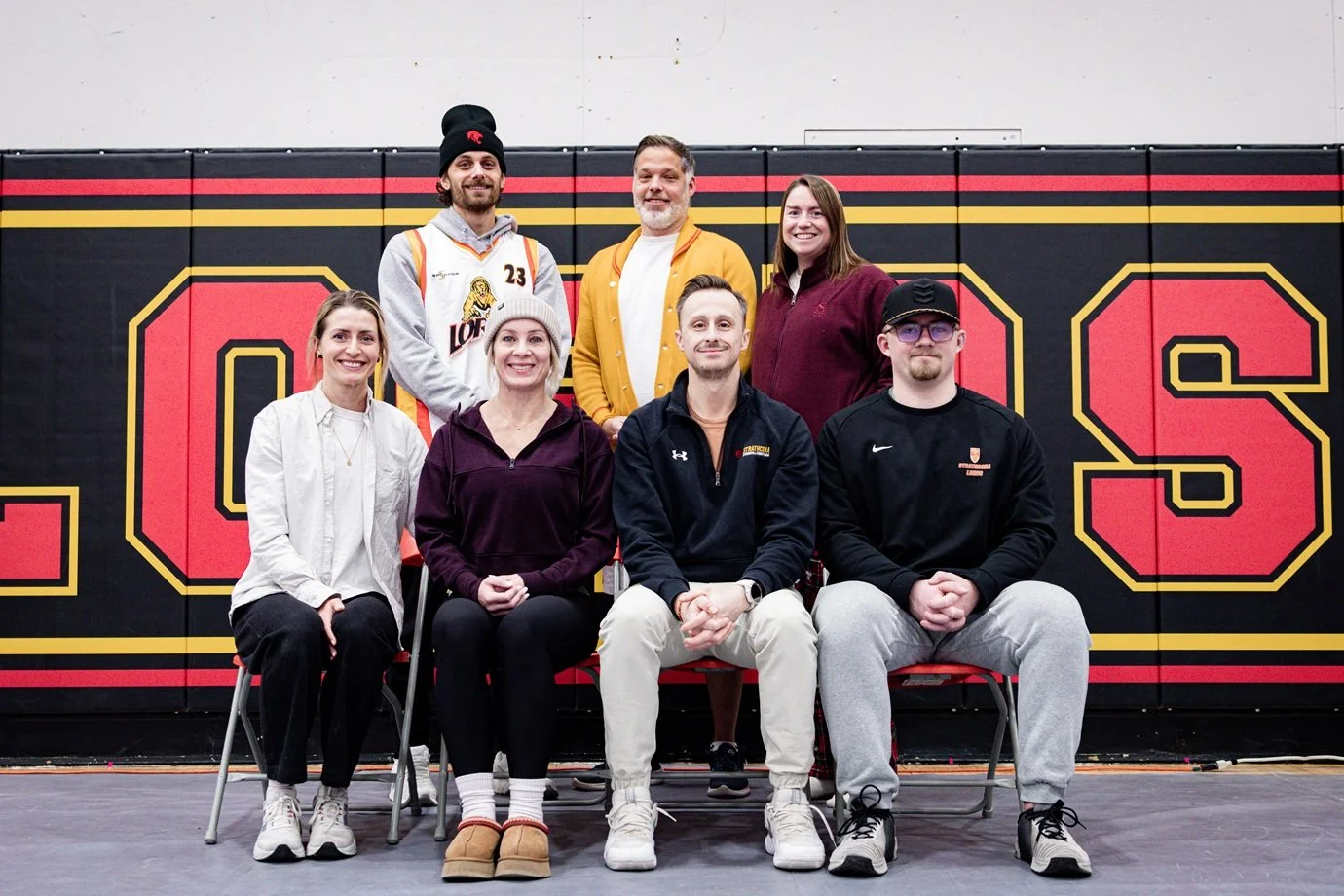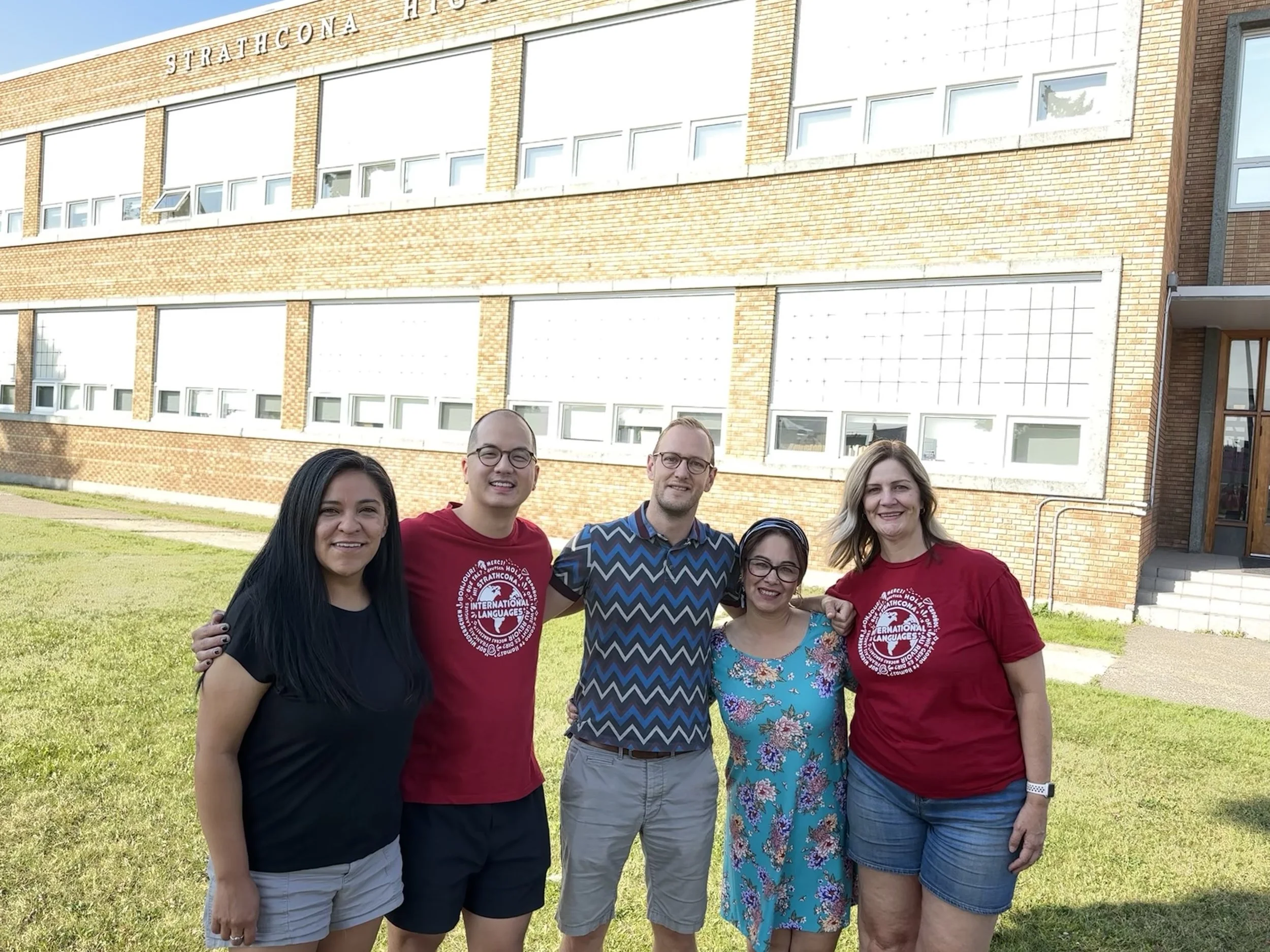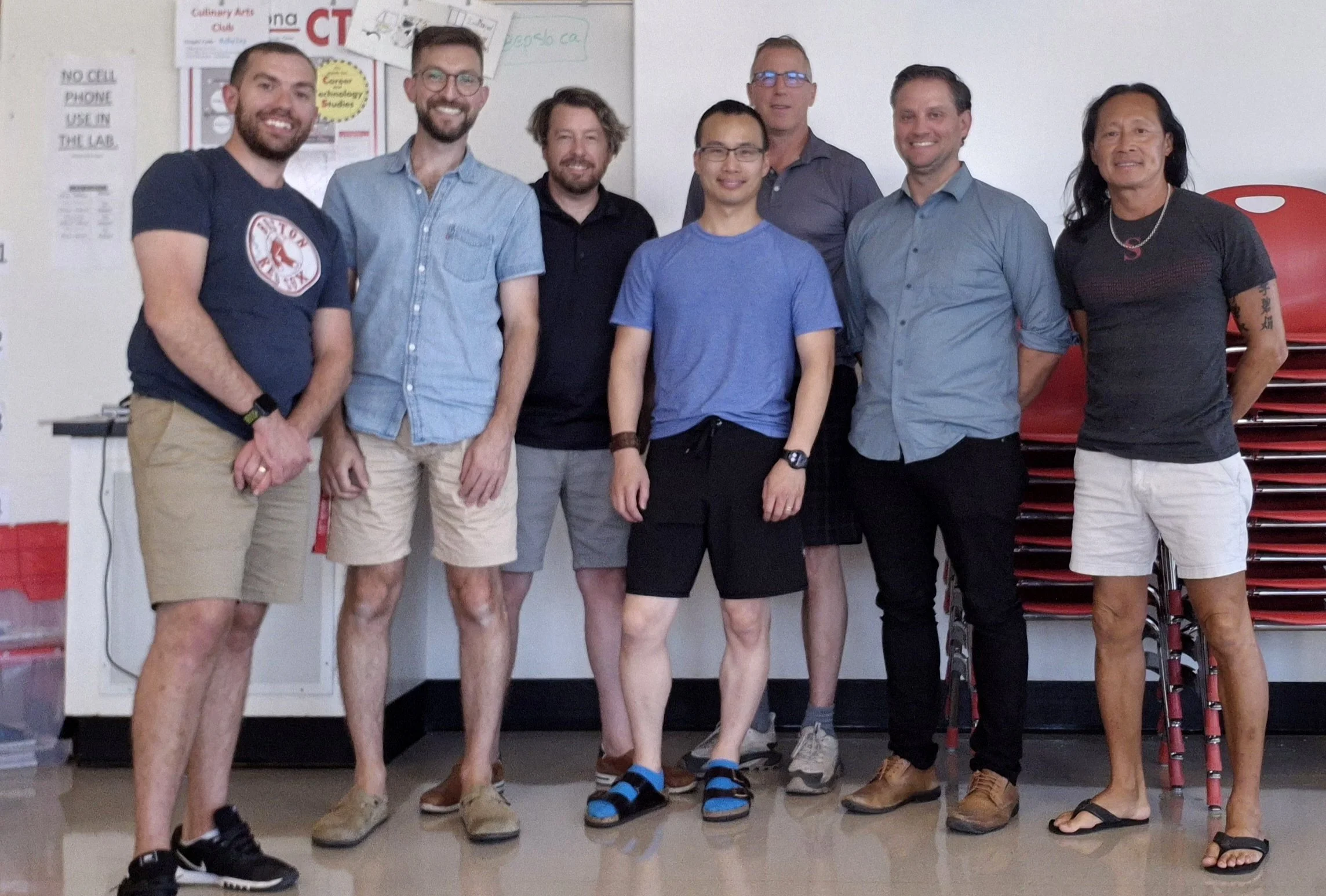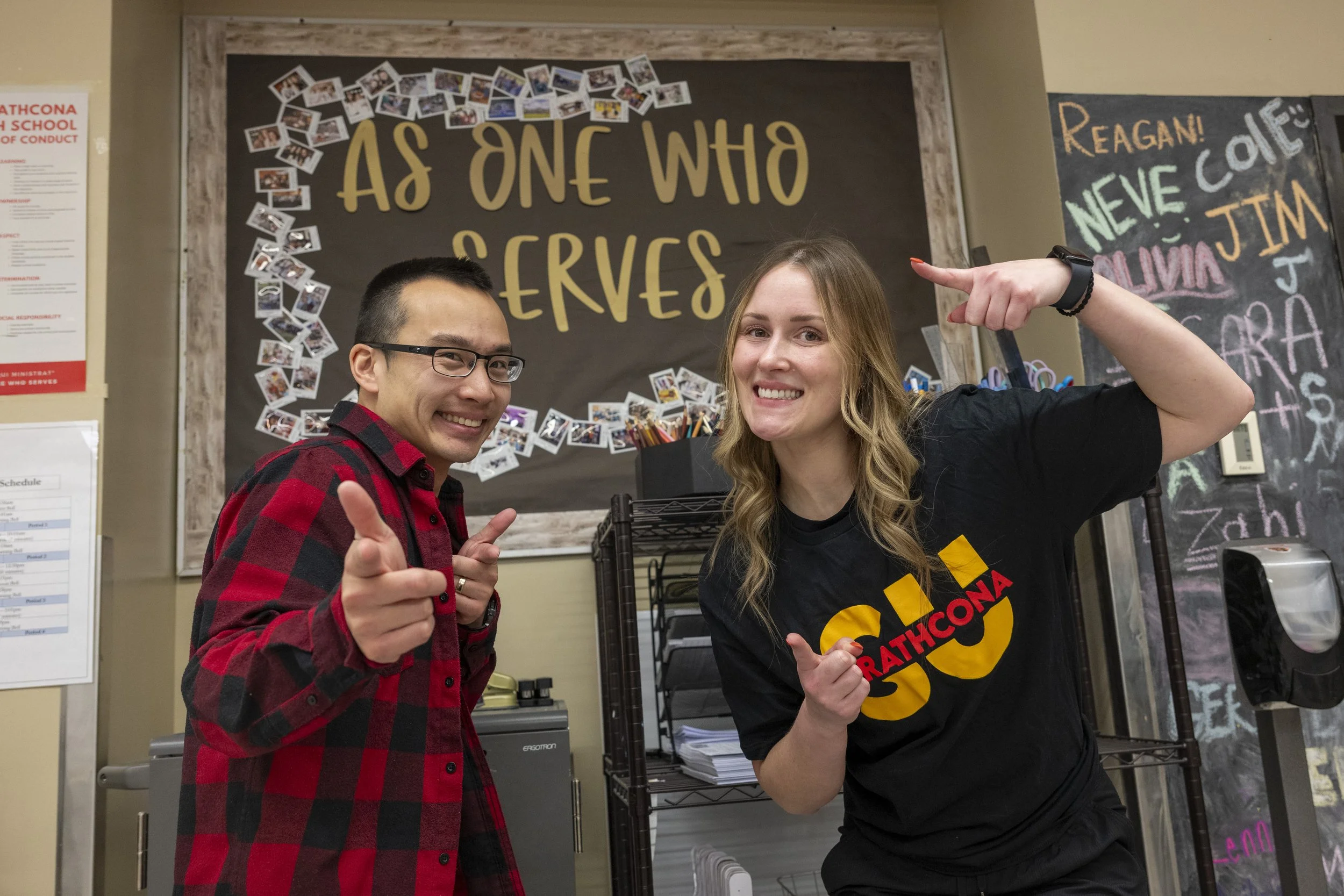Frequently Asked Questions
Here you will find the answers to some of the questions we commonly get asked on Open House night. Please have a read through! If you have other questions, no problem! Our main school website and the Program Guide are great places to go and look for more information as they provide even more context and information about each of these areas. Don’t hesitate to come to one of the department break out rooms on the night of Open House to ask your questions live to the teacher and student representatives!
FAQs- English
How much of a difference is there between grade 9 and grade 10 English?
English 10-1 moves away from a creative to a more analytical approach to writing. Students are introduced to close reading, literary criticism, and the importance of using evidence from selections to defend interpretations.
What topics do you cover?
The course is taught by genre, sometimes with a focus on certain recurring themes, e.g., The Individual and Society, The American Dream. Genres can include: essays, non-fiction, short stories, novels, poetry, Shakespearean drama, film, and modern plays.
How many essays do I have to write in each level?
The main writing focuses include: personal response to literature, critical response essay-writing, and development and refinement of one's own style and writing skills. Evaluation will be based upon at least four crafted compositions.
Why do we continue to learn about Shakespeare in school?
Shakespeare’s themes still resonate with us some 400 years later. His plays explore love, jealousy, honor, treachery, tenderness, anger, despair, fear, and courage, and evoke questions of morality, politics, war, wealth, and death. Shakespeare helps us better understand ourselves.
FAQs- Math
What is the recommended mark to take Math 10C or Math 10C AP?
To be successful in Math 10C, the recommended mark from grade 9 math is at least 65% or a grade of A or B. To take Math 10C AP, the recommended mark from grade 9 math is at least 80%.
What is the difference between 10C and 10C AP? Is AP more difficult or have more homework?
In Math 10C AP, the pace is slightly quicker to accommodate students’ faster processing time, and to allow time for the extra unit which is taught from Math 20-1. Students in Math 10C AP are in an environment with like-minded individuals who excel at math and are passionate about numbers. AP is not more difficult than regular 10C. The assessments used are of the same difficulty level across both classes. AP students may be given more challenging questions in class to enrich their learning. The amount of homework is the same in both classes. Students in Math 10C and Math 10C AP can expect about 30-60 minutes of daily homework.
What is Math/Science Transitions? Who should take this course?
Transitions is a bridging course to help prepare students for Math 10C and Science 10. Key concepts from junior high, Math 10C, and Science 10 are reviewed so that students are better prepared for success in Math 10C and Science 10. Typically students with a mark between 50% and 64% or a grade of C in grade 9 math take this class to strengthen their math skills and foundation. Students with marks below 50% in grade 9 math should take Math 10-3.
What resources do we use? Do I need to have a graphing calculator for class?
Each course has its own workbook that students will borrow at the start of their course. A graphing calculator is required in all -1 and -2 courses. Strathcona recommends the TI-83 Plus, TI-84 Plus or TI-84 CE graphing calculator.
FAQs- Science
At the Grade 10 level, is there a Bio/Chem/Physics course?
Bio/Chem/Physics 10 has been replaced with one Science 10 course to rule them all. It includes a unit for each of those three topics as well as a unit on energy transfer in global systems.
If I take Science 14, can I go on later into Bio/Chem/Physics 20?
After completing Science 14, you should talk with your adults (teacher, parent/guardian(s), and/or counsellor) about your options. If you decide you want to take Biology, Chemistry, and/or Physics 20, you will need to take Science 10 first.
What type of laboratory facilities does Strathcona have?
Labs and Experiments: At Strathcona, we have four independent lab rooms to conduct experiments. We use experiments to enhance learning and meet curricular requirements. Students are expected to wear appropriate personal protective equipment, such as goggles and closed-toed shoes, when in the lab.
Should my child take all three sciences (Biology, Chemistry, and Physics)?
Some students choose to take all 4 Science courses (Biology, Chemistry, Physics, and Science) while other students decide to take just one. The choice really depends on your interests, abilities, and what career path you choose.
FAQs- Social Studies
What are the major themes in social studies?
Throughout the entirety of the high school social studies curriculum we examine the interactions between people and the impact. Social 10 explores the long term effects of globalization in both the historical and contemporary context. This provides students the opportunity to critically examine the legacies of historical imperialism and contemporary globalization. Social 20 gives students the opportunity to explore major events tied to nationalism such as the French Revolution, World War One/Two and how ultranationalism contributed to these events. Social 30 provides students with the opportunity to examine political systems in relation to ideology. Students will examine such events as the Russian Revolution and the Cold War.
What is the workload in AP compared to -1?
Advanced Placement covers the Alberta Social Studies curriculum and the Advanced Placement European History Curriculum over the course of three years. As AP Social at Strathcona covers more breadth and depth of content, in some ways a higher workload as compared to -1 courses is unavoidable. That said, students often appreciate the writing styles covered by the AP curriculum, and should not take the workload in -1 classes lightly.
Is there much of a focus on writing in the -2 stream?
We focus quite a bit on writing in the -2 stream, since the 30-2 diploma features three separate writing assignments to complete. Writing strategies and techniques are integrated throughout 10-2, 20-2, and 30-2 so that students can feel confident and prepared going into their diplomas.
What is the difference between Psych 20 & 30?
Psych 20 is an introductory Psychology course. Topics covered are; approaches to psychology, personality, intelligence, social psychology and psychological disorders.
Psych 30 is called Experimental Psych - we study the brain, behavioral psych, memory and motivation - with opportunities to conduct psychological research and experimentation.
Psychology 20 is recommended before taking Psychology 30.
How does Strathcona's Social Studies Department address Indigenous peoples of Canada?
In addition to highlighting content from the Social curriculum, Strathcona regularly offers Alberta's Aboriginal Studies 30 course as an option for students. Students engage with relevant cultural, historical, and political content, and have had opportunities to participate with guest speakers and field trips to help deepen their knowledge and understanding of Indigenous peoples in Canada.
FAQs- Fine and Performing Arts
ART
What kind of things do you do in Art class?
The units of each class differ from year to year, but consistent units are drawing, painting, mixed media, sculpture and art history. Art 10 is a foundational course that focuses a lot on drawing, proportion and starting to explore new mediums. Art 20 continues to focus on the importance of drawing, while starting to explore new techniques, such as abstraction, printmaking and more mediums. Art 30 focuses on students creating a personal portfolio of work that explores their personal interests and developing a personal artistic identity.
The option to enroll in Advanced Placement art starts in Art 20. Students in the AP stream are working towards submitting a portfolio of work to the AP College Board.
I didn’t take Art in junior high, can I still take Art in high school?
Yes! Art 10 does not have a prerequisite, so it is open to all students! Everyone is welcome! We start off with the drawing unit and we will demonstrate all the tricks of the trades to help you become a better artist whether you have lots of experience and confidence or if you are learning it for the first time.
DRAMA
What happens in drama class?
The course of study provides a multi-dimensional experience that captures the breath and depth of theatre as an art form and exposes students to historical, contemporary, social, multicultural, and cutting-edge concepts in theatre. Students are actively involved as creators and evaluators of theatre arts. Scona theatre students graduate not only as trained actors, technicians or improvisers with artistic integrity and shared standards of excellence, but critical thinkers, arts leaders and advocates for the theatre arts.
The units of each class differ from year to year, but consistent units that are studied in each level (10/20/30) include: scene study, improv, movement and stage combat. Drama 10 will usually create small pieces that tour to neighboring elementary schools. Drama 20 classes usually undertake an outside of school production. Drama 30 classes explore directing and unique styles of theatre.
Why drama?
Drama is key for many reasons. Confidence, Creativity, Problem Solving, Teamwork-it’s all there. Yes the program can be for the aspiring young actor, as the Theatre Department offers an intense, conservatory-styled, professional training program. While the major concentration is on acting, students are also given the opportunity to study technical theatre, ensemble building, leadership and theatre management and many skills that can prepare you for beyond high school whether college or work bound.
There are also opportunities outside of the drama class to continue to expand your horizons, build your resume and team building experience like the student-directed one-acts festival SconActs, Mainstage Musicals or Plays or performance opportunities at several school events.
DANCE
What kinds of things do you do in a dance class?
In dance class we explore a range of exciting styles of dance. This includes Contemporary, Jazz, Hip Hop, Ballet, Tap, Modern, and more! In addition to this we dive into how to create compositions, and the theory behind this. We also look at the historical background and current cultural influences behind some of the most significant figures and movements in dance. Students also get to work with sought after choreographers and professional dancers throughout the course. To cumulate the year, students work towards putting together a final dance performance to share with their community.
Is the dance program for any skill level?
Dance students come from a diverse range of technical backgrounds - from beginner to pre-professional! Dancers who have limited to no experience in dance are encouraged to enrol in our Dance 15-25-35 stream. This program is designed for dancers who have a passion for moving and want to learn new styles and techniques in a safe and supportive dance community! NEW this year at Scona, we will be offering an Advanced Dance 15-25-35 stream for students who have already developed a technical foundation in dance. This stream will offer the same curriculum, but provide students with the additional challenges and opportunities to refine their technique and complement their previous experience or on-going studio training. Dance is and should always be for everyone regardless of their background! Everyone who has a passion to explore their movement and artistic expression is welcome and can find a place with Scona Dance!
IMPROV
Why should I take improv? What can I take away from it?
Improv classes are a great way to be a part of a true team and to gain confidence and feel more comfortable speaking to or leading a group of people. Improv drops you into that wondrous world of high-energy, immediate, person-to-person interaction where you learn to build and support a team and ideas. To add, an improv class is one of the few places in life where you have permission to genuinely “fail” without fear. By definition, you’re experimenting and trying things on without judgment. Improv is about accepting other people's ideas and not letting fear get in the way. It’s also a really fun class where the three Scona Improv teams emerge from.
Does Scona have an improv team?
Scona has a minimum of three teams per school year. The Nosebowl Team, The Canadian Improv Games Team and The Northern Alberta Improv League Team. These teams play in monthly and yearly competitions/festivals. Last year, the Scona Nosebowl team won gold in the province and the CIG team won gold at Nationals. The teams also host an optional Friday lunch jam in front of an audience each week and participate in monthly competitions with Rapid Fire Theatre and yearly with the Wildfire Improv Festival. Our improvisers also teach workshops to other schools from kindergarten to grade 12 which is excellent for resume and skill development.
MUSICAL THEATRE AND ADVANCED ACTING
How do I get into this class?
These classes are by audition. The team of teachers who teach these classes help prepare you for your audition. For musical auditions it is a song and for the play auditions a monologue and some improvisation. If selected you will receive 5 credits for the course itself.
Tell me more!
Once the casts are confirmed they meet 2-3 times a week. As the show gets closer to performance there may be more rehearsals. The Scona Theatre Co. performs at the Art Barns, the Scona stage and various locations suited to the style of the show that is happening.
MUSIC
Does Scona provide band instruments?
Yes! Instruments are available for rent for $120.00 for the duration of the course.
Where do we perform throughout the year?
The band performs at McDougall United Church and have been for the past 8 years! Other venues have included (and may include) the Citadel, Yardbird Suite, Hawrelak Park amphitheatre, and various places around the province for festivals!
What does Jazz Band look like at Scona?
There is one instrumental jazz group at Scona, Jazz Ensemble. It is an auditioned group (happening in September) and is a 5 credit course. Students must be enrolled in Instrumental Music 10/20/30 to participate. Rehearlals/classes run Mondays and Thursdays from 3:30 pm - 4:45 pm.
In order to perform in either group, you must be a member of the Instrumental Music class.
What does Guitar look like at Scona?
Guitar 15/25/35 is offered at Scona. They are 3 credit courses and Guitar 15 is designed for the absolute beginner with nor prior experience reading music or playing the guitar. The 25/35 courses build upon the reading of chords and musical notation developed at the Guitar 15 level.
TECH THEATRE
What kinds of things do you do in this program?
This is a 5 credit course where we cover lighting, sound, stage management, production, construction and costuming. If you are more interested in a particular area of tech you can often focus on that when we have specialized projects and school productions to work on! Like many of these programs no previous experience is necessary!
What is the time commitment for this class?
Outside of attending our class (after-school), students need to complete 125 hours of service, however our students often end up completing many more because they find they want to keep offering their time to learn and experiment with tech theatre.
FAQs- Physical Education
Is PE 10-Co-Ed a required course to graduate?
The short answer is yes. PE 10 is a 5 credit class that focuses on getting students active at the level that they are at. Students get a variety of opportunities to find multiple activities that they are interested in.
What do you do in Sports Performance?
There are 5 modules that are completed over the duration of the course. Students regularly have access to the Wellness Center during this class. The breakdown is roughly 35% classroom activity/course work and 65% wellness center.
Can students take both Sports Performance and PE 10 - Co-Ed?
Yes. Sports Performance and Phys Ed are two separate courses. Students are welcome to take both!
What is a Strength and Conditioning Coach?
Strathcona Highschool is dedicated to promoting the physical health and wellbeing of our school community. Our school has provided a full time Strength & Conditioning coach to operate our fitness center, providing programming, guidance for all students, staff and athletes, as well as educational support for all sports performance and physical education classes at Strathcona High School.
FAQs- Athletics
What sports are offered?
Strathcona is a member of the Metro Edmonton High School Athletics organization. We offer:
Football (Sr. and Jr.) (last 2 weeks of Aug until Mid-Nov*)
Flag Football (Females only) (mid-Sept until the end of Oct)
Volleyball (Sr. and Jr.) (Sept-Nov*)
Swimming (all categories) (mid-Sept until the beginning of Dec)
Cross-Country (all categories) (Sept-Oct*)
Curling (Oct to the beginning of Mar*)
Golf (May and Sept-Oct*)
Indoor Soccer (Nov-Feb)
Basketball (Nov-Mar*)
Badminton (Feb-May*)
Rugby (mid-Feb-June*)
Unified Sports (April and May)
Soccer (Sr. Men’s and Women’s and Jr. Men) (Apr-Jun)
Track & Field (Mar-Jun*)
Wrestling (Nov.-Feb.). Please speak to an Athletic Director for information.
*End of the season could be determined by Provincial tournament dates.
Are there any “no-cut” teams offered?
Strathcona Athletics takes a lot of pride in providing opportunities for all our students to compete in sports. We believe we have the largest percentage of our student community involved in athletics and will strive to continue this in 2026-2027. We invite every student, regardless of experience or ability to come out and participate in:
Cross-Country
Swimming
Track & Field
Ultimate Frisbee
*Open to all, but if there are more bodies than uniforms, students may only be practice players.
How do I participate in a sport not offered at Strathcona?
If you are interested in a sport that Strathcona does not provide (ex. Cheerleading and Handball), we work closely with other High Schools within the district to provide a fair opportunity for our students to participate. If this is something you are interested in, please contact our athletic directors, Joshua.Spronk@epsb.ca and Kyle.Palmer@epsb.ca.
Please follow @sconaathletics on Instagram, and listen to the school news/announcemnts for the latest athletics events and tryouts.
FAQs- International Languages
What language course do you offer?
We offer 20 different language courses, in French, German, and Spanish!
Please visit our Programming Overview, our website, or page 30 of our Program Guide to learn more.
How much French/Spanish/German is used?
For the AP French, Spanish Bilingual and German bilingual programs, the target language is exclusively used in class. All instruction and communication is in French/Spanish/German.
For the French as a Second Language, Spanish Language and Culture, and German Language and Culture courses, the target language is used 90% or more during classroom instruction.
Click here for more FAQs specific to French, Spanish, and German programs at Scona.
What kind of instructional and learning activities do you do?
Speaking, Listening, Reading and Writing activities in the target language.
Viewing of videos and films in the target language.
Field trips to restaurants, theatres, and other cultural destinations.
How is high school language learning different than in junior high?
Classes are longer, and overall instructional time is significantly increased, allowing much more time to communicate in the target language! Your confidence and fluency will grow so much!
All of the students in high school language classes have chosen the course allowing for a focused learning environment with people passionate about languages.
There are incredible opportunities for exchanges to Quebec, France, Spain, Mexico, and Germany, which are a great way for students to increase their fluency and learn first hand about the culture.
FAQs- Career and Technology Studies
FINANCIAL MANAGEMENT
Why should I take Financial Management?
Financial management is crucial for youth because it builds a strong foundation for lifelong success. Learning to budget, save, and manage debt early on fosters their financial independence and confidence. It helps young people distinguish between needs and wants, avoid high-interest debt traps, and save for important goals like education or a first home. Ultimately, early financial literacy reduces future stress and equips them to make informed, responsible decisions as adults.
CONSTRUCTION
What can you expect to learn in construction?
Our main goal in the construction class is to ensure that each student has an awareness of the building process. We do many hands-on activities in the construction lab. From making cutting boards to framing a model house, considerable attention is devoted to devising a plan and executing it properly. This often involves working collaboratively as a team. Throughout the class, you’ll build the proficiencies and confidence needed to succeed in the construction industry. While allowing you to explore a broad range of careers in the skilled trades, our program is intended to help you create pathways for your success.
Do I need to have background experience to take construction?
No, background experience with the use of tools is not a requirement to join construction. We review safety consistently to ensure that each student has a thorough understanding of the various construction tools used for every project.
MEDIA STUDIES
Why is Media Studies useful?
Communication is a key part of our lives, and looking at the general rules for communicating visually ie. layout & composition, use of colour, use of font/typography, use of white space etc. can help us understand how to draw people’s attention and direct people’s eyes towards what we want them to know.
What types of projects do you make?
Media studies is about exploring ALL forms of mediums for communication. We explore communication through photography, designing images on the computer, laying out documents like movie posters, books, websites, products, etc., making films, etc. Media Studies most directly connects to design programs and communication programs in post-secondary and this class can certainly help prepare you for that.
COMPUTER SCIENCE
Do I need to know how to program already?
No. The majority of our Computer Science 10 students have not coded before. However, for any of you that have coded, we will adapt to keep you interested and challenged. While programming is obviously a huge part of the course, we do explore many other topics including emerging technologies, how the hardware works, etc. Plus, 'coding for creativity' is a huge focus so be prepared to have some fun!
How many sciences can I take at Scona?
Computer Science is considered in the same category as the traditional 3 sciences for entrance into many Alberta universities. Many students take Computer Science in grade 10 while they have flexibility in their timetable. They can then decide which of the 4 sciences (Bio, Chem, Physics or Computer Science) they wish to take in grade 11. If you wanted you could even take them all!
MECHANICAL DESIGN
Why would I take Mechanical Design?
This course is intended to give you a great understanding and consideration of mechanical systems and processes used when repairing, maintaining or purchasing anything that is mechanically operated. This is a great life skills class which will also be useful as a background to some post - secondary learning that you may pursue.
FOOD STUDIES
What do you learn about in Food Studies?
The course is intended to allow you to learn different cooking skills! While using a variety of ingredients and recipes from around the world you will learn about food safety, the role of food and nutrition, and gain the ability to work in any kitchen whether at home or even at a restaurant!
FAQs- Leadership
What are the main course objectives?
Team building
Work to strengthen and create new relationships
Develop skills to help you as a leader (ex., Decision making, conflict management, problem solving, communication)
Help build a sense of belonging for all students and help foster a school culture
Honour our motto, “As One Who Serves,” and develop a sense of social responsibility
Leave the Leadership Program being the best version of yourself possible
How can you best be successful in the course?
The success of our class will be determined by the willingness of each individual to participate to their fullest, challenge their own potential, and be open-minded in order to connect with students from different social groups and interests.
Group work can be challenging at times, but it can also be incredibly rewarding. We will show students how to use group work to create excellent results and, more importantly long long-lasting relationships.It mentions in the program guide that this class is based on “experiential learning.” What does that mean?
Experiential Learning is the process of making meaning from direct experience. The father of Experiential Learning, John Dewey, famously said, “We don’t learn from our experiences, we learn from reflecting on our experiences.” As a result, there will be many in-class lessons that will provide unique experiences that students can reflect upon.
Is Leadership and Student Activities the same thing?
Leadership is a COURSE you can take here at Strathcona. The Students’ Union is a CLUB you can be a member of here at Strathcona. To be a member of the SU, you do not need to take Leadership, but many students in Leadership are interested in the event planning and spirit building that takes place in the SU. Leadership and SU are like a Venn diagram with a focus on culture and community building in the middle.
FAQs- Advanced Placement
How do I start my AP journey?
Some of our AP courses start in grade 10. Others start in grade 11. In grade 10, students register for English 10AP, Social Studies 10AP, Math 10AP, Science 10AP, and/or Capstone Prep 10. AP courses in Second Languages, Art, and Computer Science work differently as described below.
For Second Languages, AP content is usually completed by students coming from a bilingual or immersion program. To access the AP content, students take Spanish Bilingual, German Bilingual, or French 31AP.
Students who are passionate about Art or Computer Science register for a grade 10 class. They begin pursuing AP coursework at the 20th level in those subject areas.
Capstone Prep is a three-credit interdisciplinary grade 10 option that introduces fundamental communication, collaboration, presentation, and research skills. This is the first course in the AP Capstone program at Strathcona.
Do students have to take “full” AP?
There is no requirement to take “full” AP. One of the advantages of the AP program is choice. Students can pursue the one subject area they are passionate about, or take a full selection of AP classes.
For more information about the Advanced Placement program, go to our AP page on our school website.
What is the difference between AP and IB?
While there are differences in the origins, philosophies, assessments, and curricula of AP and IB, there are now far more similarities in the experiences and opportunities students have, regardless of whether they are in an AP or IB program. Both programs offer academically rigorous curricula that encourage students to work with challenging material at an accelerated pace, go into more depth, and develop the skills and habits that will be assets as they complete high school and move to post-secondary studies.
AP and IB are recognized at post-secondary institutions throughout the world. One is not better or more beneficial than the other.
Our best advice is to choose a school, and if an honours program is something you’re interested in, register for the program offered by the school of your choice.
What if I change my mind about AP?
If students are achieving an honours standing in their grade 9 classes, we encourage them to try AP in grade 10. In most courses, students are not able to enter the AP stream in their grade 11 year.
Once in high school, each April, students make choices about their courses for the upcoming year. Students in an AP class are not obligated to continue in the AP stream. We encourage students to make informed choices and plan a program that best meets their needs.
Will my marks be lower in AP classes?
Typically, students do not find that their marks are lower in AP classes. Evaluation in each class is based on the Alberta Program of Studies. An external AP exam is written at the end of each course sequence, typically in grade 11 or 12, and this grade does not factor into the final mark for a course.
Is there a lot more homework in AP classes?
Homework in your AP classes might look a bit different, but there is not necessarily more homework. Because classes often move at a faster pace, students may need to work more independently and prepare more outside of class. Developing these workload and time management skills in high school is tremendously helpful for post-secondary studies.
How do I register in the AP program at Strathcona?
When you select your classes, you will have the opportunity to select Advanced Placement courses. Typically, we recommend that these classes require an 80% average in your grade nine class. (This is class by class, rather than a cumulative average.) There are no limits to how many students can register in Advanced Placement classes. We tailor our timetable to students’ course requests.
FAQs- Student Services
What is Student Services?
Student Services is your one-stop-shop any time you need some support. We offer counselling in three different areas:
Academic Success: Study strategies, managing stress, exam accommodations, picking the right classes for you, learning English, and finding a tutor are all examples of supports we can provide for you.
Post-Secondary / Career Counselling: What do you want to do after high school? We can help you explore career paths, learn about the world of work, and navigate the post-secondary admissions process. We also love to help you find scholarships and can coach you through what makes an impressive application.
Personal Counselling: This includes support for anything that might be going on in your life inside or outside of school, like difficulties with relationships, worry or anxiety, or feeling depressed. You are not alone to deal with these things! We can even facilitate cultural support so that you can speak with someone who understands your unique situation.
As I plan, how do I find out which of my classes can be used for admission to post-secondary studies?
There is no one single answer to this question! Many courses at Scona can be used and some that you might not even realize! Different institutions and different programs and faculties often have different entrance requirements. Our counsellors are up-to-date on all the requirements and you can always book a time to meet with them to discuss all of your choices and potential pathways!
REGISTRATION SPECIFIC QUESTIONS:
When is the deadline to apply?
All pre-enrollment must be completed by 4:00 pm on Wednesday, March 25, 2026. This is done through SchoolZone for EPSB students, and an online registration form for non EPSB students.
When will I find out if my application has been successful?
You will be notified by Friday, April 11, 2025 as to whether you were successful or not in joining Strathcona High School for the 2025-26 school year.
How do I know if I am registering in the correct courses?
Feel free to make an appointment with one of our counsellors! They are happy to help.
Here is their contact information:
tracy.gerun@epsb.ca
tom.yonge@epsb.ca
School phone number: 780-439-3957
They can also answer other questions you might have regarding registration and what your next year can look like!
FAQs- Work Experience/
Registered Apprentice Program (RAP)
Who is eligible to take Work Experience/RAP?
Any high school student is eligible to complete Work Experience 15-25-35 provided that they have completed the CTS module HCS 3000. Students under the age of 18 must have their parent’s permission to participate in this off campus learning opportunity.
Does the Work Experience//RAP Coordinator find jobs for students?
The coordinator does not directly find jobs for students. This person can help with the job search and connect the student with employment opportunities when they are available.
What is the role of the Work Experience/RAP Coordinator?
The work experience coordinator is responsible to ensure that the student is working in an age appropriate employment opportunity and he/she ensures that the place of employment is a safe place to work. The coordinator tracks the student and is responsible for reporting hours worked and assigns credits at the end of a school year.
RAP students are required to submit their hours worked to the Alberta Apprenticeship Board for credit to be applied towards their first year apprenticeship.
How many credits can be earned?
Work Experience 15–25–35 courses, at each level, may be offered for 3, 4, 5, 6, 7, 8, 9 or 10 credits. Each course is time-based; i.e., 25 hours per credit, and a student may enroll in Work Experience 35 without having completed Work Experience 15 and/or Work Experience 25. Work Experience 35 does count towards the graduation requirements in the section of “additional 30 level courses”
Students may earn up to 30 credits in work experience, but the number of work experience credits that may be counted toward the Alberta High School Diploma is 15.
Who do I speak to if I am interested in Work Experience/RAP?
Please contact the Work Experience/RAP Coordinator at the school and arrange a time to meet to discuss what is possible.
ETS- Transportation
Students can use School Special Route 652 from Southgate Transit Centre and School Special Route 655 from South Campus Transit Centre to get to Strathcona High School. ETS route 701 stops within two blocks of the school on 106 Street.
For additional information, parents can find more information on edmonton.ca/transit.
Route brochures for current regular ETS bus routes can be found at edmonton.ca/RouteBrochures.
Route maps and schedules for current ETS School Special bus routes can be found at edmonton.ca/SchoolSpecialBusRoutes.
For students traveling to/from an On-Demand Transit community, more information about the service and how to use it is available at edmonton.ca/OnDemandTransit.
Please note: route map and schedule information may be adjusted as part of ETS’s fall service changes. Information about fall service changes will be available in late August on edmonton.ca/TransitAlerts. ETS works with local school boards to ensure School Special schedules are aligned with school hours.


